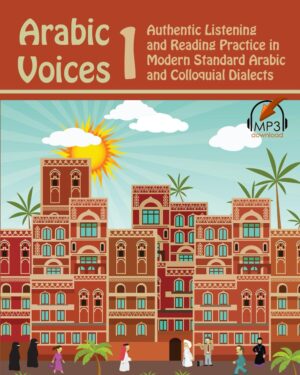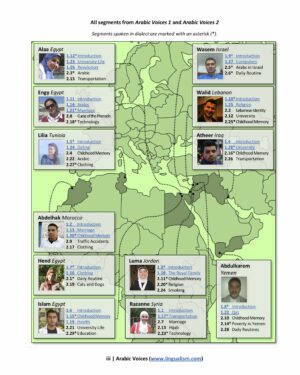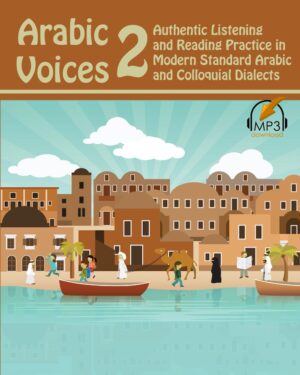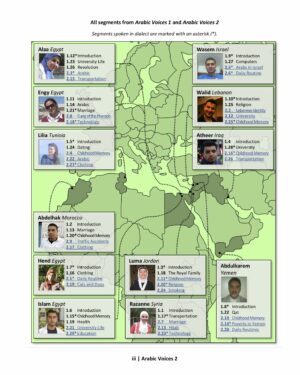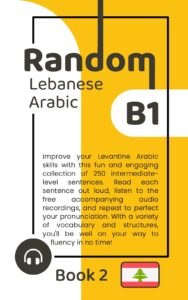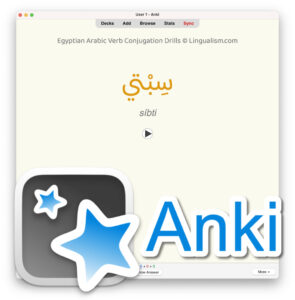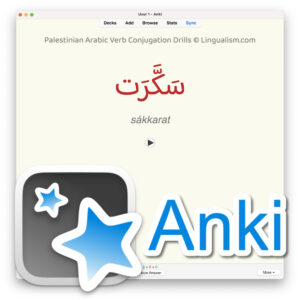Home » Modern Standard Arabic » The Arabic Language–Lilia
The Arabic Language–Lilia
| Greetings and welcome! [00:00.2] | السلام عليكم ورحمة الله وبركاته، أهلًا ومرحبًا بكم. | |
| In this video we will comment on what Lilia said about the Arabic language, as well as the different dialects, and comment on the different words and phrases she used. [00:05.2] | في هذا الفيديو سنعلّق على ما قالته ليليا بشأن اللغة العربية، وكذلك اللهجات المختلفة، وسنعلّق على ما استخدمته من كلماتٍ وعباراتٍ مختلفة. | |
| And we start on page 125, specifically on line 3—Lilya says: (How not?!). [00:18.5] | ونبدأ في الصفحة المائة خمس وعشرون، وتحديدًا في السطر الثالث—تقول ليليا: (وكيف لا؟!). | |
| She asks (How not?!," but in fact she is not waiting for an answer; It knows the answer, and this we call in the Arabic language [derogatory interrogation], and this means that you are asking a question but you know the answer, but you just want to confirm what you are saying. [00:29.7] | وهي تسأل (كيف لا؟!)، ولكن في الحقيقة هي ليست في انتظار إجابة؛ فهي تعلم الإجابة، وهذا نسميه في اللغة العربية [ بالاستفهام الاستنكاري]، وهذا يعني أنك تسأل سؤال ولكنك تعرف الإجابة، ولكن فقط تريد تأكيد ما تقوله. | |
| For example, you say: (Who will do the job better than you!," you know that he is the best, but you ask a disapproving question, [00:52.9] | فمثلًا تقول: (من سيقوم بأداء الوظيفة أفضل منك!)، فأنت تعلم أنه الأفضل ولكن أنت تسأل سؤال استنكاري، | |
| Or you make a disapproving question, because you know the answer to the question but want to confirm it; This is what we call [a disapproving question]. [01:05.1] | أو تستفهم استفهامًا استنكاريًا، لأنك تعلم إجابة السؤال ولكن تريد تأكيد هذا الأمر؛ وهذا ما نسميه [بالاستفهام الاستنكاري]. | |
| We then move to line 6, where Lilia says: (But unfortunately, every Arab country has a distinct local dialect). [01:19.4] | ننتقل بعد ذلك إلى السطر السادس، حيث تقول ليليا: (ولكن مع الأسف الشديد فإن لكل بلدٍ عربي لهجة محلية مميزة). | |
| And as we probably mentioned before, you can use the phrase [unfortunately], [unfortunately], or [unfortunately] when talking about something unpleasant or unpleasant, you can say [but very unfortunately, but unfortunately, but Unfortunately] none of these statements is true. [01:30.7] | وربما قد أشرنا إلى ذلك من قبل، يمكنك استخدام عبارة [مع الأسف]، أو [للأسف]، أو [لسوء الحظ] عند الحديث عن أمر غير سار أو أمر غير محمود، فيمكنك أن تقول [ولكن مع الأسف الشديد، ولكن للأسف، ولكن لسوء الحظ] أيًا من هذه العبارات يكون صحيحًا. | |
| on line 9, Lilia says: (Whereas the Maghreb dialects...or Moroccan dialects are more complex and more difficult to understand, such as Tunisian and Algerian). [01:57.5] | في السطر التاسع تقول ليليا: (في حين تعتبر اللهجات المغاربية… أو اللهجات المغربية أكثر تعقيدًا وأعسر فهمًا كالتونسية والجزائرية). | |
| Here Lilia uses [superlative], where she says [more and left-handed]. [02:12.0] | وهنا تستخدم ليليا [صيغة التفضيل]، حيث تقول [أكثر وأعسر]. | |
| You can use the [superlative], and then use the [source] to select your preference or what you are comparing. [02:18.5] | ويمكنك استخدام [صيغة التفضيل]، واستخدام [المصدر] بعدها لتحديد ما تفضله أو لتحديد ما تقارنه. | |
| For example, she says: (This book is more difficult to understand than others, this book is more difficult to understand than others," meaning that it is difficult to understand. [02:31.2] | فتقول مثلًا: (هذا الكتاب أصعب فهمًا من غيره، هذا الكتاب أصعب فهمًا من غيره) أي أنه يصعب فهمه. | |
| (This topic is more complex than others," you specify [compare], you use [source] after [superlative]; (more complicated). [02:42.7] | (هذا الموضوع أكثر تعقيدًا من غيره)، فأنت تحدد [المقارنة]، تستخدم [المصدر] بعد [صيغة التفضيل]؛ (أكثر تعقيدًا). | |
| This is what she also said on a previous line, specifically on line 2, when she said: (The richest and most complex of structures," as you can see she uses the [superlative], and then uses the [source] to determine what you are comparing and as you can see you use the infinitive to determine what you are comparing. [02:57.0] | وهذا ما قالته كذلك في السطر السابق، تحديدًا في السطر الثاني عندما قالت: (أغناها تركيبًا وأكثرها تعقيدًا)، كما ترى تستخدم [صيغة التفضيل]، وبعدها تستخدم [المصدر] لتحديد ما تقارنه وكما ترى تستخدم المصدر لتحديد ما تقارنه. | |
| Great! We then move to line 10. on line 10, Lilia says: (Moroccan dialects are completely different from Middle Eastern Arabic dialects). [03:33.5] | عظيم! ننتقل بعد ذلك إلى السطر العاشر، ففي السطر العاشر تقول ليليا: (فاللهجات المغربية تختلف تمامًا عن اللهجات العربية الشرق أوسطية). | |
| Lilia here uses the verb [different], and when using the verb [different] it is used with the verb differs [from]; You say (this matter...or is this person different from others, this book is different from others," and so, you use [about] with the verb [different]. [03:52.8] | وتستخدم ليليا هنا الفعل [يختلف]، وعند استخدام الفعل [يختلف] تستخدم مع الفعل يختلف [عن]؛ تقول (هذا الأمر… أو هو هذا الشخص يختلف عن الآخرين، هذا الكتاب يختلف عن غيره)، وهكذا، فتستخدم [عن] مع الفعل [يختلف]. | |
| On line 18, Lilia says: (Also, it is easy for a Tunisian to understand the Egyptian or the Lebanese, while the Egyptian and the Lebanese find it difficult to understand the Tunisian dialect). [04:14.4] | في السطر الثامن عشر—تقول ليليا: (كما إنه من السهل على التونسي فهم المصري أو اللبناني، في حين يجد المصري واللبناني صعوبة في فهم اللهجة التونسية). | |
| So Lilia here uses the phrase [while] to mention something that contradicts what she said before, as she mentions two things; The second thing contradicts what I mentioned first. [04:31.0] | فتستخدم ليليا هنا عبارة [في حين] لذكر شيء يتضاد مع ما قالته من قبل، فهي تذكر أمرين؛ الأمر الثاني يتضاد مع ما ذكرته أولًا. | |
| (It is easy for a Tunisian to understand an Egyptian or a Lebanese) and this is a positive thing, but the other part is something that contradicts him (the Egyptian and the Lebanese… and the Lebanese find it difficult to understand the Tunisian dialect); The phrase [while] is used to connect these two opposing ideas, just like the phrase [while] or when you use [while]. [04:45.3] | (إنه من السهل على التونسي فهم المصري أو اللبناني) وهذا أمر إيجابي، ولكن الجزء الآخر أمر يتنافى معه (يجد المصري واللبنان… واللبناني صعوبة في فهم اللغة اللهجة التونسية)؛ فتستخدم للربط بين هاتين الفكرتين المتضادتين عبارة [في حين]، وهي تمامًا مثل عبارة [بينما] أو عندما تستخدم [بينما]. | |
| You can use [while] in this sentence you say: (It is easy for a Tunisian to understand Egyptian or Lebanese, while Egyptian and Lebanese find it difficult to understand Tunisian dialect," use [while] or use [while], both of which are correct. [05:14.8] | فيمكنك استخدام [بينما] في هذه الجملة تقول: (إنه من السهل على التونسي فهم المصري أو اللبناني، بينما يجد المصري واللبناني صعوبة في فهم اللهجة التونسية)، تستخدم [في حين] أو تستخدم [بينما]، فكلاهما صحيح. | |
| You can say: (We see that many people are getting richer, while others are getting poorer) or (while others are getting poorer...) both are true; [while] and [while] to express something that contradicts what came before it. [05:34.6] | يمكنك أن تقول: (نرى أن كثير من الناس يزدادون غنى، بينما يزداد الآخرون فقرًا) أو (في حين يزداد الآخرو… الآخرون فقرًا)، كلاهما صحيح؛ [بينما] و[في حين] للتعبير عن شيءٍ يتضاد مع ما قبله. | |
| Great! We then move to line 20, where Lilia says: (which calls for the use of the classical Arabic language to facilitate the process of communication and understanding between Arabs). [05:54.6] | عظيم! ننتقل بعد ذلك إلى السطر العشرون، حيث تقول ليليا: (وهو ما يستدعي الاستعانة باللغة العربية الفصحى لتسهيل عملية التواصل والفهم بين العرب). | |
| the preposition [lam] is used here to mention the reason, and after the preposition [lam] we use [the explicit source]. [06:09.8] | وتستخدم حرف [ اللام] هنا لذكر السبب، وبعد حرف [ اللام] نستخدم [المصدر الصريح]. | |
| We may have mentioned this before, but we would like to review, quickly say: (I went out of the house … for a walk) using the [explicit infinitive], or you can also use the [present tense], (I went out of the house to take a walk," and the l Here it is used to state the reason. [06:18.8] | ربما قد أشرنا إلى ذلك من قبل، ولكن نودّ مراجعة، سريعًا نقول: (أنا خرجت من المنزل… من المنزل للتنزه) باستخدام [المصدر الصريح]، أو يمكنك كذلك أن تستخدم [الفعل المضارع]، (أنا خرجت من المنزل لأتنزه)، واللام هنا تستخدم لذكر السبب. | |
| We then move to line 27, and Lilya says: (This does not negate that the language of Al-Daad, the Arabic language—this is one of the terms we use to refer to the Arabic language—is threatened with extinction). [06:43.8] | ننتقل بعد ذلك إلى السطر السابع والعشرين، فتقول ليليا: (فإن هذا لا ينفي أن لغة الضاد أي اللغة العربية—هذه أحد المصطلحات التي نستخدمها للإشارة إلى اللغة العربية—مهددة بالإندثار). | |
| The word [threatened] is used here from the verb [hadad], and with the verb [hadad] the preposition بـ is used. [07:00.2] | وتستخدم هنا كلمة [مهددة] من الفعل [هدد]، ومع الفعل [هدد] تستخدم حرف [ الباء]. | |
| It says (this person has threatened him with death," for example, or (this building is threatened with collapse," and so on, it is used with the verb [threatened], with the preposition بـ. [07:08.5] | تقول (هذا الشخص قد هدده بالقتل) مثلًا، أو (هذا البناء مهدد بالانهيار)، وهكذا، فتستخدم مع الفعل [هدد]، تستخدم معه حرف [ الباء]. | |
| On line 30, Lilia says, "In contrast to Arabic, which has been dispensed with in oral communication." She uses the passive voice. [07:25.5] | في السطر الثلاثون تقول ليليا: (على عكس اللغة العربية التي أُستغنى عنها في التواصل الشفوي)، وتستخدم المبني للمجهول. | |
| And we had explained the passive building, which is a form of the verb with which the subject is not mentioned, and as you can see here the subject has … it is included in the context of speech. [07:39.7] | وكنا قد شرحنا المبني للمجهول، وهو الصيغة من صيغات الفعل لا يذكر معه الفاعل، وكما ترى هنا الفاعل قد… هو متضمن في سياق الكلام. | |
| (You know who dispensed with him was dispensed with in oral communication) That is, people dispensed with oral communication, or people dispensed with the Arabic language in oral communication, the actor can be estimated or deduced from a context… from the context of speech. [07:53.7] | (أنت تعرف من استغنى عنه أُستغنى عنه في التواصل الشفوي) أي استغني الناس عن التواصل الشفوي، أو استغنى الناس عن اللغة العربية في التواصل الشفوي، فالفاعل يمكن تقديره أو استنتاجه من سياق… من سياق الكلام. | |
| Great! We then move on to line 35, where Lilia says: (and it even contains obscene expressions, and may offend modesty). [08:14.5] | عظيم! ننتقل بعد ذلك إلى السطر الخامس والثلاثون، حيث تقول ليليا: (وحتى أنها تحتوي على عباراتٍ بذيئةٍ، وربما تخدش بالحياء). | |
| This is a phrase we use to say that something is not acceptable, or that a word is not acceptable, [08:26.7] | وهذه عبارة نستخدمها للقول بأن أمرًا ما غير مقبول، أو أن لفظًا ما غير مقبول، | |
| It is an obscene word, or it is something that is not respected by others. For example, if someone insults another person, this is a matter that offends modesty, meaning that others are harmed by hearing it. [08:33.6] | فهو لفظ بذيء، أو أنه أمر لا يُحترم من الآخرين، فإن مثلًا إن سب شخص، شخصًا آخر فإن هذا أمر يخدش بالحياء، أي يتأذى الآخرون من السماع إليه. | |
| [It offends modesty], (This matter offends modesty) or (It offends modesty," then this is something that offends the listener, and we say [This offends modesty] or [It offends modesty]. [08:51.0] | [يخدش بالحياء]، (إن هذا الأمر يخدش الحياء) أو (يخدش بالحياء)، فهذا أمر يتأذى سامعه، ونقول [هذا يخدش الحياء] أو[يخدش بالحياء]. | |
| And finally on line 39, Lilia says: (It is difficult to know all the rules...their rules, and to understand Mama...their principles). [09:06.9] | وأخيرًا في السطر التاسع والثلاثون—تقول ليليا: (فمن الصعب الإلمام بجميع قواعد… قواعدها، والإحاطة بماما… بمبادئها). | |
| Here Lilia uses two synonyms to express mastery of grammar and mastery of knowledge of the principles of language. [09:19.6] | وهنا تستخدم ليليا كلمتين مترادفتين للتعبيرعن إتقان القواعد، وإتقان معرفة مبادئ اللغة. | |
| If you know… If you know something perfectly, you say [I know it], or [I know it], or [I know it]. [09:32.6] | إن كنت تعرف… إن كنت تعرف شيئًا تمام المعرفة، فتقول [أنا ملمٌ به]، أو [أنا محيطٌ به]، أو [محيطٌ بالأمر]. | |
| It says [Al-Ihtahat al-Amr] or [knowledge of the matter] both with one meaning, so here you can use the word [briefing] with [rules], and the word [knowledge] with [principles] both of which have the same meaning. [09:43.5] | تقول [الإحاطة بالأمر] أو [الإلمام بالأمر] كلاهما بمعنّا واحد، حتى يمكنك هنا أن تستخدم كلمة [إحاطة] مع [قواعد]، وكلمة [إلمام] مع [مبادئ] كلاهما بمعنّا واحد. | |
| You can say: (It is difficult to comprehend all its rules, and to know its principles) The same thing means the same thing. [09:59.5] | يمكنك أن تقول: (فمن الصعب الإحاطة بجميع قواعدها، والإلمام بمبادئها) نفس الأمر يعنيان نفس الشيء. | |
| And with this, we have finished commenting on what Lilia said about the Arabic language. [10:09.7] | وبهذا نكون قد انتهينا من التعليق عمّا قالته ليليا بشأن اللغة العربية. | |
| I hope you have benefited from this video. [10:17.0] | أتمنى أن تكونوا قد استفدتم من هذا الفيديو. | |
| Thank you very much. May the peace, mercy and blessings of God be upon you. [10:19.3] | أشكركم شكرًا جزيلًا، والسلام عليكم ورحمة الله وبركاته. |
Video Lessons
Arabic Voices MSA Lessons
Arabic teacher Mostafa Ahmed takes us through segments in MSA from Lingualism's book Arabic Voices 1: Authentic Listening and Reading Practice in Modern Standard Arabic and Colloquial Dialects, explaining interesting points of grammar and vocabulary.
© 2024 Lingualism LLC

